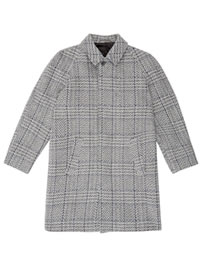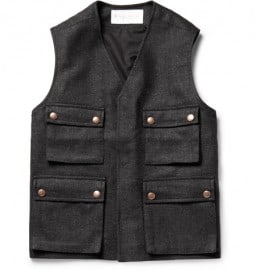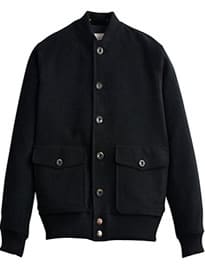After several decades of outsourcing our clothes manufacturing, menswear’s coming home. With luxury labels and cottage industry clothing brands alike looking to keep manufacturing on home soil, ‘Made in Britain’ is menswear’s new major movement.
But what does that mean to you? After all, we get everything from our gadgets to our groceries from abroad. Isn’t that the benefit of globalisation? And like homegrown footballers, it sometimes seems like a British passport for a piece of clothing is just an excuse to add a hefty premium to its price.
‘Made in Britain’ is not just a fad however. As with food, we’re gradually cottoning on to the ethical and environmental implications of locally sourced (supporting the domestic economy, providing jobs for Britons). But it’s not as simple as looking at the label, since ‘Made in Britain’ doesn’t always mean better; it doesn’t even always mean the item was actually made in Britain.
Confused? Us too. So to unpick this buzzphrase, we spoke to three native clothing brands to understand the significance of ‘Made in Britain’ – and help us all grasp the real meaning of this moniker.
E. Tautz
Patrick Grant is the brains behind Savile Row bespoke tailor Norton & Sons and runway brand E. Tautz. He’s also the man that proves traditional craft and modern design are not mutually exclusive.
While he guesstimates that 95 per cent of his products are ‘Made in Britain’, that isn’t a badge of quality in and of itself. “There are some pretty bad British factories, with poor ethical standards,” he says. “But the good ones, which we use, are genuinely excellent.”
 Designer Patrick Grant
Designer Patrick Grant
For Grant, the imperative to buy made in the UK is largely economic. “We caused large-scale unemployment and the destruction of hundreds of communities when we decided that we wanted cheap clothes,” he says. “By choosing to buy high-quality clothes made in the UK, we can help try to reverse that.” Indeed, the clothes that E. Tautz makes – exceptionally well – are not inexpensive. But the alternative is also costly.
Supporting British manufacturers is a cause that is extremely dear to Grant’s heart – so much so that he bought one of his suppliers, Cookson & Clegg in Blackburn, earlier this year: “I know the factories, I know many of the people that work there, I know the communities they exist within.”
 E. Tautz AW15
E. Tautz AW15
To produce a quality product, it helps if you have history together. “The people who make the yarns that go into our knitted and woven products know about sourcing raw fibres,” says Grant.
“The relationships they have with cashmere herders, cotton growers and merino farmers are long-standing. Our spinners have been spinning for generations. And it’s the same with sewing. There’s a genuine difference in the garment you get from someone who’s been sewing for six months versus someone who’s been sewing for 20 years. Longevity is everything.”
 Cookson & Clegg
Cookson & Clegg
Current Styles
- E. Tautz Double Breasted Urquhart Check Shirt Jacket

- E. Tautz Raglan Car Coat – Grey/navy Tweed

- E. Tautz Navy Harrington Jacket

- E. Tautz Mooskit Shetland Knit

- E. Tautz 8-ply Nordic Crew neck

- E. Tautz Grey Cashmere Hooded Sweater

- E. Tautz Khaki Chino Trouser

- E. Tautz Terry Trouser Herringbone

- E. Tautz Atlantic Blue & Navy Contrast Sock

Private White V.C.
Named after WWI hero Jack White, Private White V.C. more than does its bit for British manufacturing. But it’s not about being blindly patriotic, according to owner James Eden.
“It’s about supporting your economy and having a clear conscience,” he says. “You know exactly where the fabric comes from and how it came to be here, that the person who has woven, crafted and sewn each component has been paid a fair wage, not trapped by poverty.”
 Private Jack White (Left)
Private Jack White (Left)
Private White has invested in its own factory in Manchester, which has paid dividends in other ways. “It’s not that a lot of brands can’t, it’s that they ignore the larger benefits,” says Eden. “Our employees are like extended family; we’ve worked with some of them for over 30 years.”
Fabrics are sourced from nearby mills in Lancashire and Yorkshire, minimising the environmental impact. But while Private White is something of a local company for local people, Eden and co are far from little Englanders. “Multicultural Britain has only benefited us,” he says. “Migrants from other EU and commonwealth countries have helped plug skills shortages.”
 Private White V.C. Factory
Private White V.C. Factory
Managing the entire supply chain ‘from sheep to shop’ ensures there are no weak links. “It’s like a supermarket microwave meal versus a home-cooked dinner,” says Eden.
“With the former, you have a list of ingredients but no real idea where each one came from or the condition it was in. You don’t even know if they’re really part of the contents at all. Whereas if you go to the local farmer’s market, you can inspect each and every item for quality. You know where it’s come from, you can tailor it to your exact specifications and you know there are no nasty surprises lurking inside.”
 Private White V.C. Autumn/Winter 2015
Private White V.C. Autumn/Winter 2015
The Factory: Private White V.C.
Current Styles
- Private White V.c. Brushed-cotton Canvas Field Jacket

- Private White V.c. Corduroy-trimmed Waxed-cotton Jacket

- Private White V.c. Wool-twill Gilet

- Private White V.c. Beatle Slim-fit Cotton-moleskin Trousers

- Private White V.c. Shearling-trimmed Cotton-canvas Car Coat

- Private White V.c. Combat Traveller Waterproof Ventile Cotton Blazer

- Private White V.c. Twin Skin Jacket

- Private White V.c. Moleskin Bomber Jacket

- Private White V.c. Picadilly Shacket

Finisterre
This cold-water surf brand and outdoor clothing company has been inundated with ethical and environmental awards in the decade or so since founder Tom Kay jacked in his corporate property job. Despite this, some of Finisterre’s built-to-last products are manufactured overseas.
“We’ve not always been able to find the manufacturers and supply chains in the UK that we can in Europe and Asia,” says Kay. “An example would be fine wool jersey. We just do not have the machinery or the dyeing and finishing capabilities to produce this fabric here. And to assemble the fabric into garments in this country just so we can put a Union Jack on the label doesn’t carry any meaning for us.”
 Finisterre’s Tom Kay
Finisterre’s Tom Kay
Too much focus on the word ‘made’ can be misleading. “We believe customers should care about where everything they buy is from,” says Kay. “But it goes beyond just where the product is made, but also what the product is made of, where the fabric was processed, spun, dyed, woven etc. It’s too simplistic to only judge whether a product is ethical or quality by where it was assembled.”
He echoes Grant when he says that ‘Made in Britain’ isn’t a Kitemark of quality: “Some of the worst factories I have seen are here and some of the best are in the Far East.”
 Finisterre Factory Workers
Finisterre Factory Workers
Kay emphasises the importance of investing in new manufacturing technology to keep Britain in the game; at the same time, he focuses on what we have historically done well. “We have an incredible heritage of knitwear,” he says. “I am yet to see a more beautifully crafted sock than from these isles.”
So interwoven are certain garments with our national identity that it’s not so much ‘Made in Britain’ as ‘What Made Britain’: “The likes of Fair Isle knitting, bespoke tailoring and hosiery contribute to the very fabric of our nation.”
 Finisterre AW15
Finisterre AW15
Finisterre: Building Relationships
Current Styles
- Finisterre Budock Jumper

- Finisterre Bowmont Jumper

- Finisterre Cullercoats Crew

- Finisterre Wyllen Shirt

- Finisterre Cws Camber Jean

- Finisterre Cws Caelus Parka

- Finisterre Cullercoats Crew

- Finisterre Koppen Mac

- Finisterre Cws Domus Shirt

The ‘Made In Britain’ Checklist
Looking to invest in menswear that’s local? Here’s how to sort the wheat from the chaff:
- Where is the fabric from? “We try to use UK cloth and yarn,” says Grant. “But this is only possible for woollen products. There’s no cotton spinning or weaving left in the UK.”
- Precisely how much of it was made in the UK? “100 per cent of the labour should be in the UK and around 90 per cent of the components should also be coming from here,” says Eden.
- Does the brand pay its way? “100 per cent of the taxes should be paid in the UK,” says Eden. “If not, you shouldn’t be allowed to use the Union Jack for your marketing.”
Final Word
Do you care about where your clothes come from? Or does price take priority over provenance for you? Which are your favourite ‘Made in Britain’ brands and why?
Give us some home truths in the comments below.








